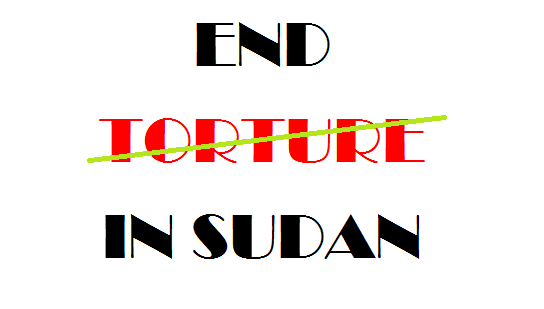(24 April 2018) Sudanese authorities should urgently investigate the reported torture and custodial death of Mr. Mosa Mohamed Salih who was reportedly accused of sharing military information with the Sudan Liberation Movement Abdel Wahid (SLM-AW). Reliable information received indicates that Mr. Mosa was reportedly tortured by members of the Rapid Support Force to confess to his affiliation with the SLA-AW.
The African Centre for Justice and Peace Studies (ACJPS) previously documented custodial deaths of two men as a result of reported torture, of a pharmacist whilst under NISS custody in South Darfur and another individual whilst under NISS custody in West Kordofan. ACJPS is seriously concerned for the safety of persons in custody given recent reports about the torture and ill-treatment.
On 13 April 2018, Mr. Mosa Mohamed Salih, a 72 year old and member of the Fur tribe was arrested from Rakoona village by members of Rapid Support Forces and then taken to the Sudanese Armed Forces/Rapid Support Forces camp in the periphery of Rakoona in East Jebel Marra, South Darfur and detained without charge for his alleged affiliation with SLM-AW.
Mr. Mosa was held in custody and died on 14 April, after spending one day in custody. A reliable source informed ACJPS that Mr. Mosa was interrogated about his presumed affiliation with the SLA-AW. It was reported that the RSF members severely tortured Mr. Mosa whilst in custody in order to obtain a confession from him about sending military information to SLA-AW. He was beaten by hand and sticks, and kicked on all over his body. Hot water was also poured over his body.
On 15 April, the RSF members took his body to a military base in Mirshing town and forced his family to come and receive his body. The family reported the death incident to the police in Mirshing but the officer refused to file a case. The family were also denied access to criminal form 8, a medical evidence form used in criminal proceedings related to death or grievous hurt.
The African Centre for Justice and Peace Studies (ACJPS) calls on the Government of Sudan to immediately investigate the grave allegations and hold those responsible to account. The reported allegations of torture and the circumstances leading to the death of Mr. Mosa should be the subject of an immediate, thorough impartial public and transparent investigation by the Sudanese authorities.
ACJPS reiterates its call for law reform and calls on the Government of Sudan to adopt legislation that defines and criminalises torture in line with international standards including the UN Convention against Torture and Other Cruel, Inhuman or Degrading Treatment or Punishment (UNCAT), provide effective access to justice and adequate reparation to victims of torture, and ensure that confessions obtained under torture are not used or accepted by courts under any circumstances. The Government should expressly denounce the use of torture by security agents to intimidate or extract confessions from persons in their custody.
Background
Sudanese authorities have been consistently implicated in the use of torture as a means of intimidation and to extract confessions. Despite the prohibition of torture in Sudan’s 2005 Interim National Constitution, other legislation, such as the 2010 National Security Act and 1994 Evidence Act, creates conditions rendering detainees extremely vulnerable to torture and ill-treatment. The 2007 Armed Forces Act, 2008 Police Act, and 2010 National Security Act each grant immunities to state actors.
The government of Sudan has repeatedly failed to ensure prompt, thorough, impartial and effective investigations into allegations of torture, ill-treatment and has failed to ensure effective remedies or provide reparation to the victims. Even in cases where the immunities mentioned above have been lifted, victims of torture have faced various barriers that make it extremely hard to report cases of torture. ACJPS is not aware of a single case where an alleged perpetrator of torture has been held to account. The ACHPR found in case 379/09 against Sudan that remedies are not available to people tortured by the NISS because the power to lift immunities is at the discretion of the director of the NISS and is not subject to judicial oversight.
Contact:
Mossaad Mohamed Ali (English, Arabic, Swedish): +256 779584542; Cynthia Ibale (English) cynthia@acjps.org
 African Centre for Justice and Peace Studies ACJPS | المركز الافريقي لدراسات العدالة و السلام
African Centre for Justice and Peace Studies ACJPS | المركز الافريقي لدراسات العدالة و السلام




